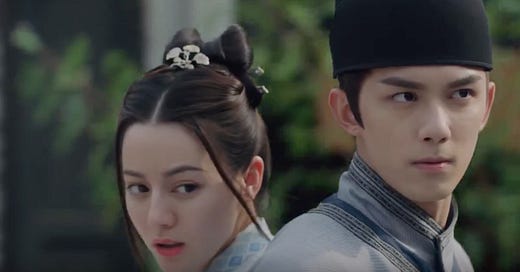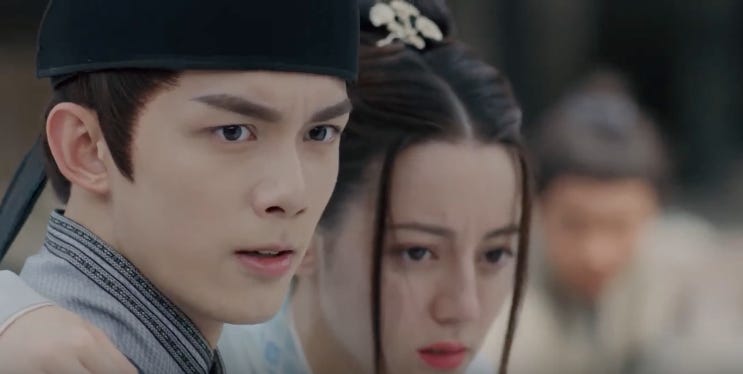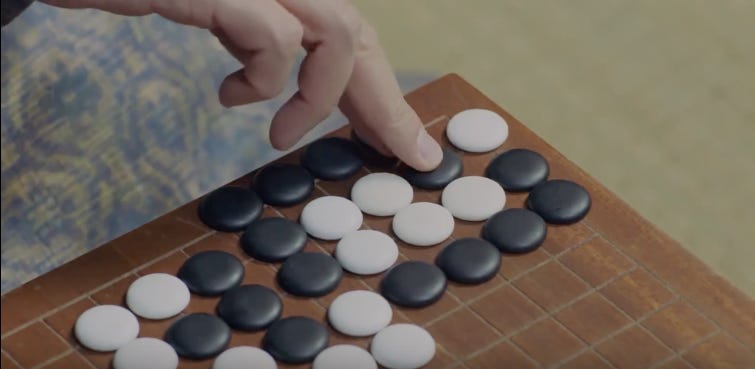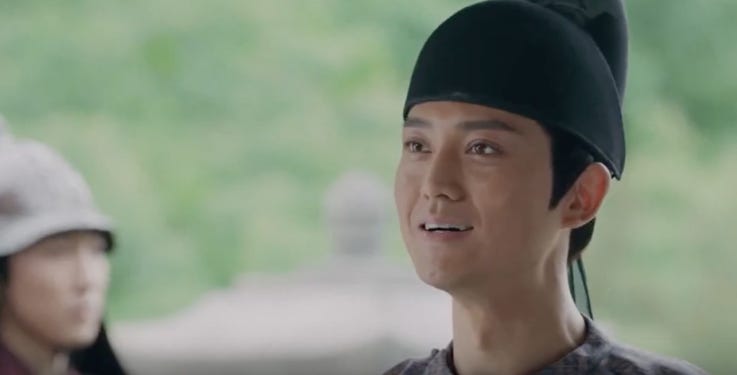I imagine that Li Changge has been written quite deliberately as an anachronistic figure in an all-too-real historical context of war and internal power struggles. A privileged duchess raised among the nobility, schooled in traditionally masculine pursuits like martial arts and the history of strategic arts, she is unconventional even for our time. But heroes real or fictionalized tend to standout from the crowd. They are heroes by the very fact that their achievements are noteworthy. Of course here she’s undoubtedly created to be more palatable for readers/audiences in a post-feminist 21st century world. A strong female persona with achievements under her belt is a figure of hope and aspiration. However, in keeping with the historical context, this outstanding female dresses in man’s clothing in order to participate in activities normally denied to her sex. It’s also telling that she doesn’t menstruate until she takes her first journey to the steppes. Something that the show is at great pains (no pun intended) to highlight. When she’s finally with the man who is worthy of her love, a man who will become the love of her life, her femininity becomes somewhat relevant. More than just a patriot, she is now a figure of romance. A romance that has important ramifications for her entire trajectory.
Her revenge scheme sets her on an entirely different path to anything she might have envisaged. Although it was to my mind a foolhardy scheme from the first, it has taken her to people and places a closeted duchess would otherwise probably not have encountered. One soon comes to the conclusion that either she has a knack of getting people to like her or that she’s fortunate enough to meet broad-minded individuals who value her talent and heart. Perhaps it’s both. Her likeability seems to cut across cultural even class barriers apparently advocating some kind of common understanding of what true heroism looks like.
So it follows that the man who wins her love is an outsider, an enemy — a military commander from the steppes. He meets her under unusual circumstances and long before he realises that she’s a she not a he, he admires her courage and will to live. Whether he knows he’s in love with her even in those early days, he at the very least knows that she is someone that he must protect no matter the cost to himself. As he says to her later that the feeling of her not being around was one he did not enjoy. And while in Tang he can help a renegade princess on the run because he isn’t tethered to the system. Illegality isn’t an issue because he is essentially a spy from another land.
When they finally meet face to face on the battlefield as adversaries, the impulse to keep her safe doesn’t diminish. His instinct is to ensure that she lives after the surrender remains intact so he takes her back to the steppes, enemy territory for her, to find a new beginning. Given her personality once she bounces back to her old self, she can’t sit still and creates all kinds of problems for him whose position among the Ashile tribe is already somewhat precarious. Things get heated, harsh words are exchanged. But when she departs from the camp, he sets aside his own pride and goes looking for her even collaborating with former enemies, winning their trust in the meanwhile. He too meets broadminded individuals along his journey in the form of Old Qin, family retainer of the governor of Shouzhou and the governor himself.
But then Ashile Sun of the steppes has a reputation for being unusually big picture oriented himself despite commanding a crack force. If he can win a battle by limiting casualties, he will. The governor Gongsun Heng knows this too and accords the young Turkic commander with the respect that is due to him. Even in war apparently there can be some kind nobility to be found on both sides.
Although there might be a feeling of unreality in all of this, these two are heroic in that they take the road least travelled while paving the way for others to take a similar path of individual fulfilment. Perhaps too from the latest happenings that now that their paths have converged, that newly formed path will be the means of bringing two hostile sides together.
In episodes 31-34, Sun has an encounter with an equally broad-minded, quirky individual in Li Jing. The drama seems to suggest that extraordinary individuals recognize and gravitate towards each other as a matter of course. The two men play Go because Li Jing, whose background is unclear at first, can tell a lot about a man from the way he plays and he catches on quickly that Sun is not who he appears or claims to be. He sizes up quickly that Sun is a soldier of distinction. At their second play, Li sets up a trap for Sun to test his steadfastness and tempts him with his monograph of military strategies. But only if the latter complies with his request to continue play. But the gong sounds out in the distance that there’s trouble where Changge is. Li continues waving the screed under his nose but Sun rejects the offer, apologises and heads off to save his lady love. Later on as the couple’s entourage heads out of the central plains in the direction of the steppes, Li is already waiting for them.
Even though he knows where they’re headed he has unofficially adopted the younger man as his apprentice and leaves him with some words of military wisdom. “The heart of the benevolent is invincible” Or literally “the benevolent heart has no enemy/rival”. Strategies, according to Li are not as important in victory as the heart of the man in charge. He leaves these words with Sun before taking off for fear of the “tigress” that awaits him at home. (Reminding us of the humorous, unorthodox relationship that the two have)
Li Jing has planted a seed. Perhaps he sees greatness in Sun because of his willingness to go as far as he does for Changge, putting life ahead of ambition. A man like Sun in Li’s economy is not only a worthy opponent in battle but an upstanding individual who will do great things for all people regardless of national boundaries.
The drama proffers hope that extraordinary people of goodwill from both sides can be instrumental in finding common ground among longtime foes.








Your insights are really good. I love reading it.